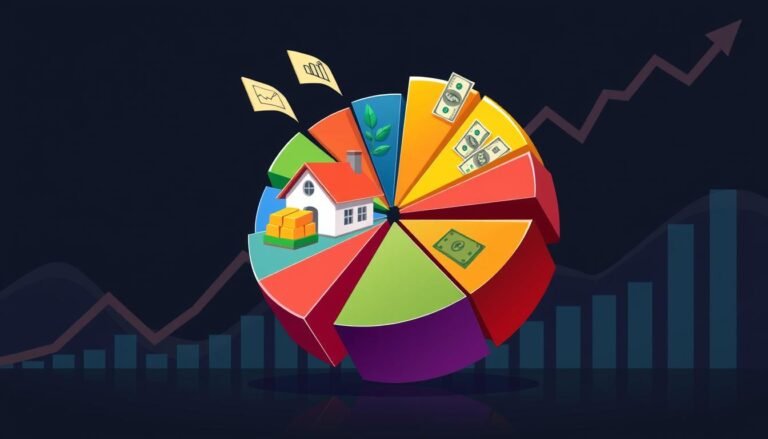Mindful Spending: Aligning Money with Values
Money talks, but does it speak your language? In today’s fast world, linking money to values is key for financial health. Mindful spending isn’t about saving every penny. It’s about using money for what really matters to you.
Studies reveal 80% of people feel right when their spending matches their values. It’s not just about the numbers; it’s about feeling good about your spending. Imagine the joy of knowing every dollar supports your beliefs and goals.
Intentional spending is more than just budgeting. It’s about understanding your financial values. It’s about making choices that meet your needs now and dreams for the future. This way, you’re not just managing money; you’re building a life that reflects your values.
Financial values alignment is unique and changes over time. What’s most important to you? Is it saving for a dream home, supporting local businesses, or enjoying experiences? By knowing these priorities, you can make a spending plan that feels like a path to your perfect life.
Key Takeaways
- 80% of people feel integrity when spending aligns with values
- Mindful spending supports present needs and future goals
- Identifying personal priorities helps create an effective spending plan
- Financial values alignment leads to increased satisfaction with money decisions
- Intentional spending habits foster a stronger connection between money and personal beliefs
Understanding the Psychology of Financial Decisions
Our financial choices often come from deep emotions and past experiences. What we spend money on shows our values and beliefs. This link between psychology and money is key to being a conscious consumer and managing money ethically.
Emotional vs. Logical Spending Patterns
Feelings greatly influence our buying habits. A huge 82% of shoppers say emotions guide their purchases. Stress, happiness, worry, and boredom can make us buy things on impulse, which might not be good for our financial future.
The Role of Values in Money Management
Our financial approach is shaped by our values. About 56% of people spend mindfully, trying to match their purchases with their beliefs and dreams. This way of managing money leads to a more satisfying life and better financial health in the long run.
Breaking Free from Impulse Purchasing
Buying on impulse often comes from wanting things right away, with 63% of such buys driven by this need. To fight this, people use strategies like waiting 24 hours before buying or only using cash. These methods help us be more mindful and stop emotional spending.
| Spending Trigger | Percentage Affected | Mindful Strategy |
|---|---|---|
| Emotional Influence | 82% | Practice self-awareness |
| Instant Gratification | 63% | Implement 24-hour rule |
| Social Media Pressure | 70% | Limit social media usage |
| Value-Aligned Spending | 56% | Create a values-based budget |
Knowing these psychological factors helps us make better financial choices. By understanding our emotional triggers and spending in line with our values, we can improve our relationship with money. This leads to true conscious consumerism.
Mindful Spending: Aligning Money with Values
Changing how we think about money can transform our financial lives. It’s about making choices that reflect our beliefs and dreams. This way of spending is more than just budgeting; it’s a path to true financial happiness.
More people, across different ages, are interested in spending money based on their values. A U.S. Bank survey found 59% of Millennials and 45% of Gen-Xers want to invest in line with their values. Even 30% of Baby Boomers are curious about this idea.
To start mindful spending, first understand where your money goes. Keep track of your spending for a month. Then, look at each area of spending. Ask yourself: Does this match what I really value?
“Consider experiences over material goods for long-lasting happiness and memories.”
Creating a budget based on your values means spending more on what’s important to you. You might cut back on things that don’t fit your priorities. This way, you’ll feel more financially satisfied and less stressed.
| Benefits of Mindful Spending | Actions to Take |
|---|---|
| Increased financial satisfaction | Prioritize meaningful purchases |
| Reduced financial stress | Limit impulse buying |
| Better alignment with long-term goals | Regular budget reviews |
Mindful spending is a journey. It’s about making choices that help you reach your goals and values. By aligning your money with what truly matters, you’re not just managing finances. You’re building a more fulfilling life.
Creating a Value-Based Budget Framework
Value-based budgeting is a strong way to manage money well. It’s not just about numbers. It’s about spending money on what’s most important to you.
Identifying Core Personal Values
First, think about what really matters to you. Is it family, learning, travel, or helping the environment? Your values should help guide how you spend money.
Mapping Financial Goals to Values
After finding your core values, connect them to financial goals. For instance, if education is key, aim to save for your child’s college.
- Family: Save for annual family vacation
- Health: Budget for gym membership and organic groceries
- Career: Allocate funds for professional development courses
Building Flexible Spending Categories
Make spending categories that match your values but also offer flexibility. This way, you can focus on what’s important and make smart spending choices.
Value-based budgeting isn’t strict. It’s about making choices that fit your values and goals. By focusing on what’s important, you’ll find it easier to stay on budget and reach financial health.
The Power of Conscious Consumerism
Conscious consumerism is changing how we spend money. It’s about making choices that match our values and help the world. This way of spending looks at the big picture of our purchases.
Ethical money management is key in this shift. By choosing companies that care about the planet and people, we can make a big difference. For instance, 62% of people worldwide are ready to change their shopping habits to help the environment.
The good things about conscious consumerism are many. It can lead to:
- Less carbon footprint from buying local
- Support for fair business practices
- Stronger local economies and more jobs
- Deeper connections in our communities
Emma Watson says it well: “As consumers, we have so much power to change the world by just being careful in what we buy.” This shows the heart of conscious consumerism – every buy is a vote for the world we desire.
By choosing conscious consumerism, our money can do good. It’s about finding a balance between what we need and what we value. This thoughtful spending leads to more meaningful purchases and a sense of purpose in our financial choices.
Practical Steps for Intentional Spending
Learning to spend intentionally is crucial for aligning your finances with your values. By being mindful, you can manage your money better. This way, you only buy what truly adds value to your life.
Implementing the 24-Hour Rule
The 24-hour rule helps you avoid buying things on impulse. If you see something you want, wait a day before buying it. This pause lets you think if it fits your financial goals and values.
Tracking Expenses Mindfully
It’s important to keep an eye on your spending. Check your bank statements often and sort your expenses. This helps you see where your money is going and where it might be wasted.
Aligning Purchases with Life Goals
Before you buy something, think if it helps you reach your goals. This simple check can change how you spend money. It makes sure your money goes towards what’s important to you.
| Mindful Spending Practice | Benefit |
|---|---|
| 24-Hour Rule | Reduces impulse purchases |
| Expense Tracking | Increases financial awareness |
| Goal Alignment | Supports long-term objectives |
By following these steps, you can develop spending habits that make you financially happy. These habits will also align with your personal values.
Overcoming Common Spending Pitfalls
Building sustainable finances means spotting and fixing common spending mistakes. These issues can mess up even the best plans for managing money ethically. Let’s look at three big problems and how to solve them.
Emotional Spending Triggers
Our spending is often driven by emotions. Stress, boredom, or joy can make us buy things on impulse. To fight this, try waiting 24 hours before buying something you don’t need. This break helps you think more about your purchase and whether it fits your financial goals.
Social Pressure and Financial Decisions
Wanting to match others’ lifestyles can cost a lot. But, true friends care about you, not what you own. Choose to spend on experiences, not things, when you’re out with friends. This way, you keep your finances healthy and your friendships strong.
Managing Lifestyle Inflation
When you get a raise, it’s easy to spend more. But, this can hurt your financial future. Instead, put some of your raise into savings or investments. This helps you manage your money wisely and stay secure without giving up comfort now.
| Spending Pitfall | Impact | Solution |
|---|---|---|
| Emotional Spending | Unplanned purchases, budget derailment | 24-hour rule, spending journal |
| Social Pressure | Overspending, debt accumulation | Focus on experiences, set clear financial boundaries |
| Lifestyle Inflation | Reduced savings, financial insecurity | Allocate raises strategically, maintain previous lifestyle |
By tackling these common issues, you’re setting yourself up for a stronger financial future. Remember, sustainable finances are about making smart choices, not cutting out all fun.
“Financial balance entails saving for the future while enjoying present pleasures, contributing to a fulfilling life.”
Sustainable Financial Practices
Embracing sustainable finances is more than just budgeting. It’s about creating a money mindset that matches your values and goals. This way, you save for the future and enjoy the present in a meaningful way.
To start, define your core values and goals. This helps you make spending choices that truly matter. For example, if you care about the environment, you might buy eco-friendly products or support companies with green policies.
The “wait rule” is a great strategy. It means waiting a week before buying non-essential items. This can cut down on impulse buys and help you spend more mindfully. The aim is to spend on what you really value, not just on impulse.
“Mindful spending isn’t about strict budgets. It’s about aligning your finances with what truly matters, bringing more satisfaction to your life.”
Regular financial check-ins are key to keeping your finances sustainable. These reviews help you stay on track with your goals and make adjustments as needed. By aligning your spending with your values, you’re more likely to achieve financial wellness and live a purpose-driven life.
Sustainable financial practices also think about the bigger picture. This might mean supporting local businesses, choosing ethical investments, or giving to charities that align with your values. By doing this, you’re not just securing your financial future. You’re also making a positive impact on your community and the world.
Building Long-term Financial Wellness
Financial wellness is more than just having money. It’s about managing your finances in a way that supports your emotional, mental, and physical health. This is achieved through financial values alignment, which guides your decisions.
Creating Meaningful Spending Goals
Setting realistic financial goals is key. These goals should reflect your values and dreams. Using a value-based budget helps you see where your money goes and how it aligns with your priorities.
Balancing Present Enjoyment with Future Security
It’s hard to balance enjoying life now and saving for the future. Building an emergency fund can help during tough times. It’s also okay to spend on things that bring joy, as long as it fits your budget.
Regular Financial Check-ins
Most Americans give up on their New Year’s resolutions in three months. To avoid this with your finances, check in regularly. Review your progress, adjust your plans, and celebrate small wins. This keeps you motivated and on track.
| Financial Wellness Steps | Benefits |
|---|---|
| Create a value-based budget | Aligns spending with personal values |
| Set up an emergency fund | Reduces financial stress |
| Automate bill payments | Ensures timely payments, reduces worry |
| Regular financial check-ins | Keeps you on track with goals |
Remember, financial wellness is a journey. It’s about making conscious choices that align with your values and goals. By following these steps and staying committed, you can build a solid foundation for long-term financial health.
Conclusion
Mindful spending is a strong way to match money with values. It’s not just about saving money; it’s about using every dollar wisely. By understanding why we spend, we can stop buying on impulse and make a budget that shows what we value.
Numbers show the power of mindful spending. People who spend mindfully use 75% of their budget for needs and 25% for wants. This leads to less financial stress and more savings. Those who check their budgets often see a 70% boost in their financial health.
Mindful spending is not about being limited; it’s about gaining freedom. It helps you achieve financial stability and happiness. By adopting this habit, you’re not just handling money; you’re building a life that matches your core values. Begin your mindful spending journey today and see how it improves your life financially and personally.
Source Links
- Building a values-based budget: How to spend mindfully
- Mindful Spending: How to Take Control of Your Finances
- Intentional Spending: Aligning Your Spending with Your Values
- Remynt
- The Psychology of Spending: Understanding Your Money Mindset
- The Psychology of Spending: Understanding Your Money Habits and Triggers – Design Dash
- Align Your Money with Your Values: 4 Key Strategies
- Follow these 4 tips to help you develop smarter, more mindful spending habits.
- Mindful Money Management: Aligning Your Spending with Your Values
- Determining Your Values and Aligning Them with Your Budget – My Financial Equity
- Three Things a Values-Based Money System Does That Budgeting Does’t
- The Power of Conscious Consumerism: Building a Sustainable Future | Simple Body
- Conscious Consumers: 5 Tips to Make Mindful Purchases
- How to Be a More Conscious Consumer — Sustainable Bliss | Self-Care and Intentional Living
- What is mindful spending and how to do it
- 14 Tips for Mindful Spending – How to Money
- The Art of Mindful Spending: 7 Psychological Secrets to Master Your Finances
- The Psychology Behind Overspending – Understanding the Internal Motivations that Lead to Financial Impulse
- Roadmap to Overcome Money Anxiety and Boost Mental Health — Invested Mom
- Mindful Spending: Aligning Life’s Realities Alongside Your Values – SGL Financial Advisors
- Mindful Spending: A Guide to Making Conscious Financial Decisions – Smart Money Education
- Aligning Your Values and Your Money — Triune Financial Partners
- Financial Self-Care: Nurturing Your Relationship with Money
- Mindful Spending: How to Align Your Financial Habits with Your Core Values
- The Art of Mindful Spending: Balancing Enjoyment and Financial Well-being
- Mindful Spending: The Heart of Financial Wellness








